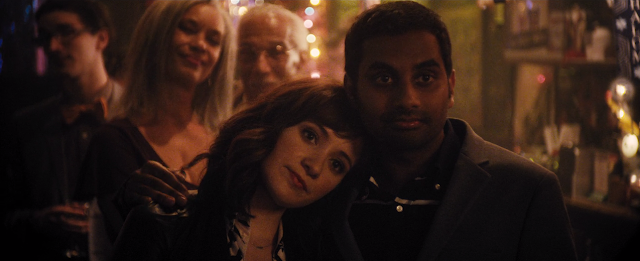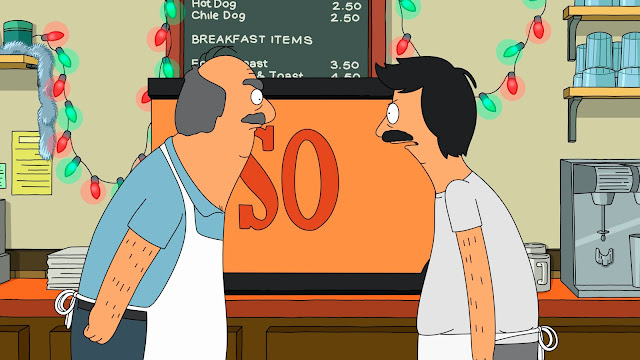The following contains spoilers for the final two episodes of Master of None.
Asian American men have been so badly stereotyped and emasculated by Hollywood (peep the Long Duk Dong catchphrase montage from "Good Morning Orlando," last week's Fresh Off the Boat episode, for a refresher course) that several Asian American male indie filmmakers have worked to counteract those stereotypes by casting either themselves or much more polished Asian actors as romantic leads, one of many kinds of roles Asian American men only rarely get to play outside the indie world. But to be honest, even though it's nice to see these directors defying stereotypes, too many of these indie flicks--or more commonly these days, YouTube shows--have turned out to be underwhelming or banal in execution. (A rare example of an indie flick with an Asian American guy as a romantic lead that isn't so underwhelming as a movie is 2011's struggling musician comedy Surrogate Valentine, and although it was directed by a white guy, Dave Boyle, it's thoroughly suffused with the creative voice of Surrogate Valentine star and co-writer Goh Nakamura.)
It's not surprising that the similarly conscious-about-race Aziz Ansari and his fellow Parks and Recreation colleague, writer Alan Yang, the creators of Netflix's remarkable new half-hour comedy Master of None, chose to open their show's very first episode with the ultimate in "Hey, I have sex too! I ain't no emasculated dork like how Hollywood likes to portray me!" moments during stories told from Asian American males' perspectives. Master of None's first glimpse of TV commercial actor Dev Shah, Ansari's alter ego, is Dev in the middle of banging Rachel (former SNL featured player Noël Wells), the record label publicist who will become Dev's permanent love interest later on in the season. The opening scene is the first of many figurative middle fingers Ansari and Yang, whose counterpart on the show is Kelvin Yu's Brian, satisfyingly deliver throughout the show to racist power players from Hollywood who either contribute to marginalizing Asian Americans, whether they're Indian or, in the case of Yang and Yu, Taiwanese, or continue to be in doubt about giving them screen roles like "one of the jobs Bradley Cooper's characters do in movies," as Dev says at one point.
Our idea with Brian was to make an Asian character that is portrayed as sexually capable like real Asian people https://t.co/rEyVuhZrTs
— Aziz Ansari (@azizansari) November 9, 2015
But because Ansari isn't such a vain comedy star--you can tell how much vanity a male comedy star has by how often he gets the staff writers to write shirtless bedroom scenes for him, like the bizarre amount of shirtless bedroom scenes that were written for the late Richard Jeni during his short-lived '90s sitcom Platypus Man--Ansari amusingly cuts short his own first-ever on-screen moment of athletic, TV-MA-rated (but without any nudity) lovemaking. He has his own character's condom suddenly break.
The broken condom scare leads to both frantic Googling of fun facts about pre-ejaculate and an emergency Uber ride for both Dev and Rachel to the nearest pharmacy for a Plan B pill and--because Dev is as passionate a foodie/drinkie as Ansari--an irresistible bottle of Martinelli's apple juice. The mishap perfectly kicks off a series of anxieties Dev experiences about children (he doesn't completely hate them, but like Ansari, he doesn't plan on having any), marriage (again, like with Ansari, the idea of it intimidates Dev), texting etiquette (another subject Ansari has been preoccupied with in his stand-up act), accepting certain acting roles that would pay well but could also cause him to be labeled an "Uncle Taj" and various other life choices.
Master of None--which gets its title from a 2006 Beach House song about a person who hops from fuckbuddy to fuckbuddy but winds up being lonely (the tune is featured at the end of the third episode, "Hot Ticket")--is Ansari's first big endeavor into auteurist TV (he also directed two of the 10 episodes that Netflix dropped all at once last Friday). The show interestingly structures itself as a series of mini-movies--hence the "Master of None Presents" logo during the main titles of each episode--and breaks away from both the joke machine rhythms of network TV ("Alan and I didn't want the show to be so cut-y. Sometimes I'd watch Parks and it's so fast-paced," said Ansari to the A.V. Club) and the studio set-bound nature of many network sitcoms like Parks.
Instead, it embraces the commercial-free pacing of Netflix and favors long single takes during street conversations or hallway exchanges like Dev's amusing exchange with his friend Arnold (Eric Wareheim) about the frustration of being unable to tell if Eminem's 8 Mile theme "Lose Yourself" is being rapped from the point of view of Em or his 8 Mile alter ego B-Rabbit ("[Linklater] has been a huge influence on me, and he has been for a few years," said Ansari in that same A.V. Club interview, while discussing his love for the long takes during Linklater's Before trilogy). The show also favors location shooting in New York (and, for one episode, Nashville) and, in what has to be a first for a half-hour comedy, cinematography shot in the 2.35:1 aspect ratio. That's the same aspect ratio all the Star Wars movies and Bond flicks (except Dr. No, From Russia with Love, Goldfinger, Live and Let Die and The Man with the Golden Gun) are filmed in.
Master of None cinematographer Mark Schwartzbard makes beautiful use of the ultra-widescreen frame. At first, the Scope aspect ratio seems like a bizarre choice for a half-hour comedy. But when Schwartzbard continually composes shots as clever and playful as the one where Brian and his laconic immigrant dad Peter (Clem Cheung) finally bond while reading The Economist, but due to Peter's Ron Swanson-like discomfort with expressing any kind of emotion, they're sitting far apart and at the edges of the frame rather than shoulder to shoulder (or when Schwartzbard sometimes composes shots that are just plain gorgeous), the aspect ratio suits the show.



























